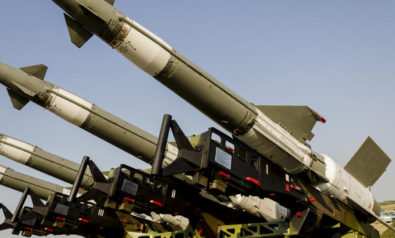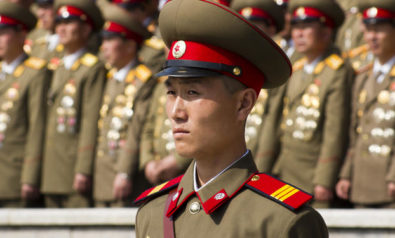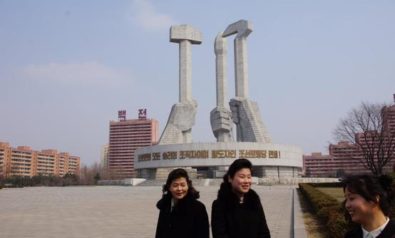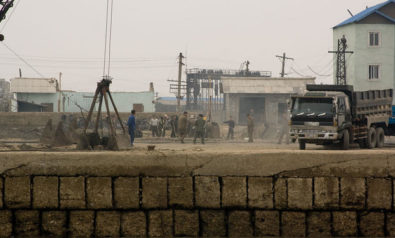The international community should normalize relations with North Korea to raise mutual cultural understanding and trust between North Koreans and the outside world.
Analyzing North Korea and its place in the international system strikes a personal chord. For me, it is frustrating that so many international actors, state and non-state, are seemingly in a state of perpetual war. The process of understanding North Korea’s society, and its conflict with the outside world, has been ongoing for a third of my life.
I joined the military in 1997 and spent all ten years of my military career overseas. The majority of my career in the military was spent on or near the de-militarized zone (DMZ) between North and South Korea. During that time period I had the fortune to share many cultural experiences with Koreans, providing me with a wealth of empirical knowledge of the actual, daily lives of people on both sides of the DMZ. I’ve also been to North Korea once, at Kaesong, and I have worked extensively with South Korean NGOs which are helping North Korean defectors and have interviewed dozens of them.
As a result of my living experience and later academic training both on the Korean Peninsula and in the United States, my analysis of events on the Peninsula is always careful to be respectful of North and South Koreans as human beings. Specifically applied to North Koreans, my analytical argument stresses that the North Korean people need to be understood as best as possible from the perspective of “their” worldview. In my view, too much analysis focusing on North Korea simplifies the conflict over North Korea’s role in the international system as simply that of a disobedient “dog” refusing to lie down to the dictates of its “master”, meaning the entire global community.
North Korea and its opponents in the international community are locked in a vicious cycle of relations. Perceived as a disobedient dog, North Korea (and its people more than its government) is punished with sanctions and threats of military force by its master, the international community. North Korea’s government, angered by the response of the international community towards it, acts out even more aggressively towards its neighbors. The North Korean people, raised in the all-encompassing social environment of the juche ideology which stresses allegiance to the state and self-sufficiency, become even more defiant against the threat of international intervention. Prospects for peace, reconciliation, and reunification of the Korean Peninsula, as a result, seem further and further away.
The international community on the whole generally perceives the North Korean state as an irrational, violent, and defiant entity that runs with a “bad pack,” nations such as Iran. In my analysis, the North Korean state would be willing to engage constructively with the international community, if it did not perceive itself as being in the midst of an existential battle. The international community’s perception of North Koreans, and not just the North Korean government, is also in my view dismissive, viewing North Koreans as helpless actors locked into system that robs them of their personal agency. It might be surprising to learn, but many North Koreans are fiercely proud of their country, and would bite back at the international community and die for the North Korean state if North Korea is threatened.
Too much of the international community’s narrative on North Korea is combative. It is time that the international community, led by the United States, engaged with North Korea’s government to normalize bi-lateral relations. A policy of engagement with North Korea will begin the long process of building trust between North Koreans and much of the rest of the world. Building trust with North Koreans will necessitate an honest understanding of their culture, society, and identity, a task that will not be east, but is extremely important ensure that sustained peace and social, political, and economic development occurs for all people on the Korean Peninsula.
It is time for the international community to move forward with the North Korean government, and to not dwell upon past tensions. In order to improve the lives of everyday North Koreans, the United States will need to set an example for the rest of international community and begin to engage bilaterally with North Korea. Most important, the international community has to begin to seek to understand North Koreans from their worldview. As a nation that has been hit, told to obey, and hit again, North Korea is naturally untrusting of foreign intentions and liable to bark, and possibly in a nightmare scenario, bite its neighbors. Avoiding war on the Korean Peninsula will depend upon expanding international and cultural and public diplomacy with North Koreans.
North Korea’s government is a rational actor that acts like a weak state struggling for its survival. Its actions are to be expected as it views itself as being surrounded by enemies with power to destroy it. I believe that the following actions need to be taken towards North Korea by the international community, led by the United States: recognizing North Korea as a rational actor with state sovereignty; acknowledging North Korea as a nuclear state; and normalizing relations with the North Korean government in the interest of beginning to interact with the North Korean people directly.
It is during the process of normalization of relations between North Korea and the international community that the greatest opportunity to positively impact North Korea’s society and the lives of its people will present itself. The international community could request to send in humanitarian support teams with aid packages, determine if the status of human rights in the country is improving, and ensure that North Korea’s nuclear program is operated safely within international standards.
Lastly, during the normalization process, I would strongly recommend dealing with each issue of concern for the international community separately. Issues such as nuclear weapons, human rights abuses, and other issues should be dealt with separately. No single issue should prevent progress towards a peace treaty between North and South Korea and the unification of the Korean Peninsula.
The author would like to acknowledge and thank Nicholas A. Heras for his attention in commenting on and editing this article.
The views expressed in this article are the author’s own and do not necessarily reflect Fair Observer’s editorial policy.
Support Fair Observer
We rely on your support for our independence, diversity and quality.
For more than 10 years, Fair Observer has been free, fair and independent. No billionaire owns us, no advertisers control us. We are a reader-supported nonprofit. Unlike many other publications, we keep our content free for readers regardless of where they live or whether they can afford to pay. We have no paywalls and no ads.
In the post-truth era of fake news, echo chambers and filter bubbles, we publish a plurality of perspectives from around the world. Anyone can publish with us, but everyone goes through a rigorous editorial process. So, you get fact-checked, well-reasoned content instead of noise.
We publish 2,500+ voices from 90+ countries. We also conduct education and training programs
on subjects ranging from digital media and journalism to writing and critical thinking. This
doesn’t come cheap. Servers, editors, trainers and web developers cost
money.
Please consider supporting us on a regular basis as a recurring donor or a
sustaining member.
Will you support FO’s journalism?
We rely on your support for our independence, diversity and quality.














Comment